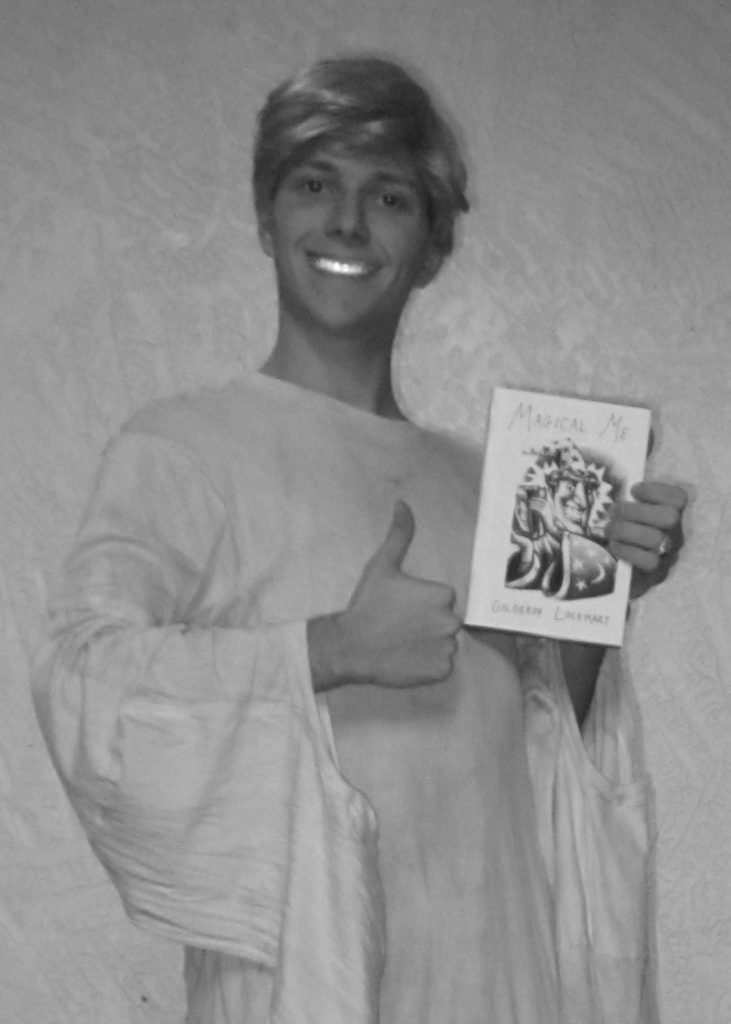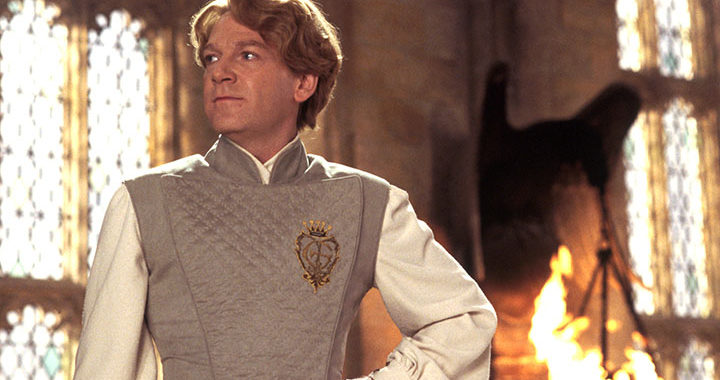Join hosts Irvin, Sierra, and Sophia and special guest Eric Scull (MuggleCast) as they discuss the Magical Me author Gilderoy Lockhart.
In this episode:
- Will Rita Skeeter write a biography of Lockhart? Is she a fan?
- The Facts, the Fraud, and the Fantastic Smile
- Lockhart would’ve gotten away with it… if it wasn’t for those meddling kids.
- What even is a Ravenclaw?
- Did Lockhart’s shampoo turn him evil?
- Lockhart wants to have Goop!
- The psychology of Lockhart cosplay
- Irvin has a completely rational vendetta against Valentine’s Day
- Does Lockhart deserve his Order of Merlin?
- The moral is not to trust books!
Resources:
The Pub’s Jukebox:
Irvin’s Gilderoy Lockhart costume:

Vote in the poll below:

ChatGPT is remarkably similarly to the Quick Quotes Quill – both will make stuff up if it’s what the user wants to hear.
—
“Fake it till you make it” can be a good strategy, but due to the halo effect (the concept Sophia mentioned), attractive people can get away with not making it (or make-up) for longer. While Lockhart is aware of the benefits of his smile, he’s probaly unaware of how much it helps.
—
One of my professors spent a lot of time trying to figure out why students succeed/fail. They found remarkably little depended on the teacher: if provided with sufficient materials, “good” students will do well anyway.
Some students, regardless of the effort that they (and their teachers) put in never seem to “get” a particular subject. Not due to an inability. it seems to be more of a mindset issue (do they have the right mental model).
—
Lockhart’s signature has been developed for publicity purposes, so of course it’s going to be fancy and over-the-top. Anyone who has to sign a lot of documents (e.g. for administrative work) likely develops a very simple, quick signature. Form vs. function.
I remember specifically trying to develop a better signature when I was a kid. Nowadays, I imagine kids wouldn’t bother.
I like your point about the signatures! A favorite moment of mine from Kim Possible is when Senor Senior Jr is busily practicing his autograph, because I imagine plenty of celebrities do just that. (And not gonna lie, I gave a lot of thought to my own signature when my book came out, though ended up sticking with what I already did because there’s so much mental gymnastics in book signings as is.)
It’s wierd to me looking back on cultural changes. I remember having an autograph book – as in a fancy notebook dedicated to collecting signatures. This was before I realised I was a chronic introvert and wouldn’t dare bother a famous person if I met them.
That said, I did go to a book signing once. But that was Pratchett.
What a fun episode!
I was wondering about Lockhart as a teacher, you guys touched upon him being a teacher to the 5th -7th years as well, and how horrible that would be for them considering they have to sit essential exams, although I cannot imagine Quirrell was that much better… This leads me to my question: Do we think compared to Umbridge where they also only read books during lessons, the students could have learned something useful from Lockhart’s fraud books? Aside from claiming it was him, we can still assume he stuck to the real “how” of the real people, which then still holds some educational value. So aside from Magical Me, the other books could still have some value.
But this also leads me to another question – does Hogwarts have a curriculum? The teachers seem to be allowed to set it themselves, however, there are exams after years 5 and 7 which seemingly are set by the government. At least in Germany, this meant that the schools oversaw the teacher’s curriculums more critically and made sure that students should at least in theory have learned everything.
I agree that the content of Lockhart’s books should be vaguely useful (especially compared to Umbridge), except that we don’t know how much of his second-hand adventures actually happened, and how much of it was tall tales.
For example, after a few drinks in the Wagga Wagga pub, a local farmer shooing away a dingo became a dramatic encounter with a werewolf, which Lockhart repeated without fact-checking.
Very good point! We do not know how much (if any) fact-checking Lockhart did. But then I would almost assume he would have to have some for the ruse to hold on for so long. On the other hand, if he is only famous in the UK and most of these stories are from abroad maybe fact-checking isn’t required as no one would realise?!
Now if wizards had the internet (or equivalent) this would probably be a lot harder to pull off.
There’s some comical stories from ye olde times about britain either believing nonsense about creatures in foreign parts, or disbelieving in real creatures despite the evidence (potentially some inspiration for the Lovegoods?).
In fairness, I’d be skeptical the first time I saw a drawing of a platypus.
I believe the information in Lockhart’s books is fairly accurate – especially since Hermione deems one of them useful enough to take in DH. Practically speaking, Lockhart wouldn’t want anyone to even approach the thought that his books might be inaccurate (since once they started digging, there’s an awful lot they could unearth…). So I imagine he was fairly diligent about reporting the magical elements etc. Y’know, like if you have a dead body in the trunk of a car, you shouldn’t blow through stop signs.
I don’t believe Hogwarts does have a curriculum – it’s totally fair game, and one hopes that the curriculum overlaps with the exams. If it doesn’t, and all the students flunk their exam, presumably there would be an outcry and the teacher’s job would be on the line, so they are fairly motivated to hew close to exam topics.
This was closer to the education system we had in the US when I was younger – Bush 43 made a big push to standardize teaching and emphasize exams when he was president (to, ahem, a displeased public).
The Lockhart article may well be based on original notes from way-back-when, but notes and ideas and characters get tweaked as they are woven into the story. Maybe think of it as the first-draft of Lockhart.
He also suits Slytherin, but that’s why he was a hatstall. His motivations competing with his values: he wants to be famous, but famous for his skills and knowledge.
I like Sierra’s note about sorting too soon. Lockhart was probably one of those clever kids that don’t have to put in a lot of effort at school, but then hit a wall at some point where they have to start working harder. I imagine that would be the point he started using other people’s work as his own.
—
An added benefit of Lockhart cosplay is that any mistakes you make are also attributed as being in-character.
—
It’s not just narcissists who assume (subconsciously) that everyone else thinks the same way they do. It’s one of the benefits of discussing personality tests – you gain an insight into other people’s values, motivations, and thought processes.
—
I don’t think Lockhart is being especially sincere about helping Harry with fame. He doesn’t drop character until Harry and Ron catch him packing. He’s jealous of Harry being more famous than he’ll ever be, so is trying to piggyback off that by inserting himself into Harry’s story as a mentor-figure.
I vote “deboning”, because it’s a situation where he both overestimated his ability and caused real harm. The dueling club was no more farcical than any of his other classes, and with the Chamber he correctly recognised that it was above him.
—
—
Okay, I have a bit of a rant about this. It’s a great line, but it’s completely undermined by the reality of the wizarding world.
For one thing, it’s incredibly difficult to determine whether something is thinking for itself or not. Chatbots are very convincing fakes. People overestimate what their roombas. Solipsism (the philosophy) suggests we can’t even be sure about other people.
Secondly, there are so many non-biological things in the books that exhibit behaviour that implies they can think for themselves, and none of them are treated with any suspicion. Portraits. Mirrors. The Ford Anglia. The Marauder’s Map. The Sorting Hat. Hogwarts. Wands.
Finally, why should having a visible brain-location matter? I’d trust a portrait over a dragon any day of the week. Mind you, this sort of bias is entirely in keeping with wizarding society.
Okay, the Exodia thing made me burst out laughing at work. That’s an excellent reference!
Excellent point on the “thinking for itself.” I guess with portraits at least, you can see where their brain is (since it’s painted on). But you’re right, plenty of things in the wizarding world display varying degrees of sentience with no suspicion. Maybe it’s a punchy way of saying “don’t trust it if you don’t know the provenance of its thinking.” ie. We trust the Sorting Hat cuz we like Godric Gryffindor, we trust the mirrors because they’re approved by the Mirror Guild of Wizards or some such nonsense… But you’re still right that it’s an awfully facile distillation of the issue.